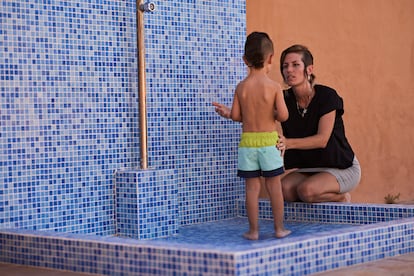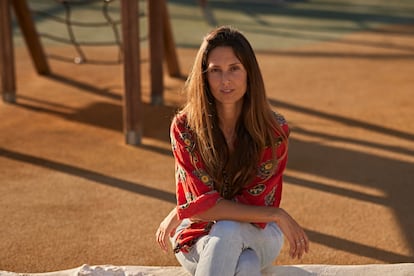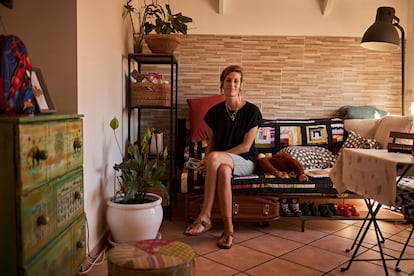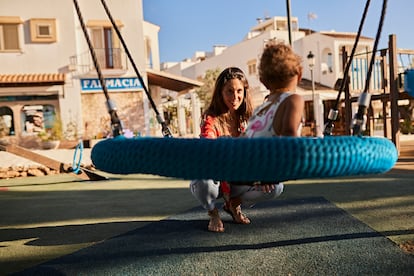Parental burnout: It’s not your children, it’s not your boss; it’s the system
Taboos about motherhood prevent many women knowing what is happening to them or feeling that they can talk about it with others

When Ane Bengoa, 36, started raising her child, she didn’t feel that magical connection everyone was talking about. She just felt like crying. But she swallowed back her tears. After all, she had a healthy baby, a loving partner and a supportive family. She had no right to complain.
Ane lives in Ibiza and her family in Bilbao. When she gave birth, she had hardly any friends with children nor did she have access to a support network. She felt lonely and angry with the world and she didn’t quite know why. “The time would pass and I’d realize I hadn’t had a minute to myself,” she explains. “That I hadn’t looked in the mirror in several months and I hadn’t slept more than two hours at a time since my son was born. My whole world had changed. Everyone else’s life kept moving and I was still at home but even so, I didn’t have any quality time or a quiet moment.”
Ane Bengoa had burnout or parental exhaustion, a non-clinical term for parents who are so exhausted by the pressure of caring for their children that they reach the end of their rope. An Ohio University report, published in May, claims that 66% of working parents fit this profile.

According to the Ohio research, women are more likely than men to suffer from parental burnout. The ratio is 68% to 42%. “It’s because women often still bear much of the responsibility for caring for their children, as well as balancing their work and family life,” explains Bernadette Melnyk, author of the study. This ratio was, to some extent, to be expected, but Dr. Melnyk highlights other aspects that are less obvious: “The study provided evidence that parental burnout negatively affects not only parents, but their children, who end up externalizing the stress in some way,” she says. The study, which was conducted between January and April 2021, provides a snapshot of a different time, when the US was housebound due to the coronavirus. The lockdown was the icing, but the cake, says Melnyk, had been baking for some time.
Another survey carried out by Lingokids in Spain reaches strikingly similar conclusions: 67% of those consulted admit that “the importance they attach to being a good parent and the effort they devote to that end becomes exhausting.”

Parental burnout syndrome does not appear in clinical manuals nor does the term feature in dictionaries. This is because it is something that is not talked about in our culture. Until recently, there was a taboo around motherhood that meant only the positive side of parenting could be mentioned. Many of those experiencing burn out could not put a name to what was happening to them. And what lacks a name tends to remain invisible. This is confirmed by Lola, a 38-year-old teacher from Seville: “Many parents are going through this, but they don’t speak about it, unless to a close friend.” After discussing the issue with mothers of different ages, Lola believes that we are facing a generational problem. “My mother didn’t feel this way,” she adds. “I think, on the one hand, we don’t have the tools they had and, on the other, we are under more pressure and are bombarded with more information.”
How the lack of authentic role models affects us
Ane Bengoa had to go to a psychologist to talk about what was happening to her. She met a group of mothers and created “a tribe.” Today, months after putting a name to her experience, she is enjoying parenting and feels less exhausted. “After more than a year, I have a clear idea of what happened to me,” she says. “I had no examples of mothers close to me. I never had babies close to me or saw any family members breastfeeding. I lacked examples in my immediate environment.”
In Spain, the birth rate has hit an all-time low – lower even than during the Civil War. And this, inevitably, means there are more isolated mothers: “Women used to learn a lot about parenting through proximity,” explains psychologist Isabel del Campo. “They had contact with friends who had children, with cousins, they had nephews and nieces. But now, as the birth rate drops, that exposure to being with other mothers before actually becoming mothers is far less. Most women come to the experience without prior knowledge.”

This is further aggravated when the lack of references in one’s immediate environment is replaced by celebrities and influencers. “The image they sell of motherhood is very romanticized,” says Natalia López, a 33-year-old mother of three from Barcelona. According to her, unrealistic standards are set, and new mothers inevitably feel they fall short. “It’s like a modern-day version of the 1950s when there was an image of what a woman had to be like. And it’s scary. You have to always be in love with your child, who in turn has to be sweet and share your values and be the most fun. And you have to do everything wearing your best smile and, if you stop going out, you are one of those women who have changed and become jerks since becoming a mother.”
All the women interviewed agree that the problem is not the children or the work; it is the system. The incorporation of women into the labor market has led wealthier parents to outsource care and those who cannot afford to do this to combine work and parenting in a distribution of roles in which women tend to lose out. On the other hand, there is a lot of information on parenting and many idealized role models with which it is difficult to identify. Motherhood is sold to us through an Instagram filter.
“We have a problem as a society,” notes Dr. Del Campo. “If you combine work and parenting, you’re likely to lack social relationships and time for yourself. And this is difficult to assume in a context in which there is a lot of pressure on parents to be conscious of how they bring their child up, to be positive and not to miss a minute.” The mothers agree with this view. In fact, Natalia López sums it up in a phrase she once read and has had in her head ever since: “We have to raise our children as if we had no job and we have to work as if we had no children.”
Tu suscripción se está usando en otro dispositivo
¿Quieres añadir otro usuario a tu suscripción?
Si continúas leyendo en este dispositivo, no se podrá leer en el otro.
FlechaTu suscripción se está usando en otro dispositivo y solo puedes acceder a EL PAÍS desde un dispositivo a la vez.
Si quieres compartir tu cuenta, cambia tu suscripción a la modalidad Premium, así podrás añadir otro usuario. Cada uno accederá con su propia cuenta de email, lo que os permitirá personalizar vuestra experiencia en EL PAÍS.
¿Tienes una suscripción de empresa? Accede aquí para contratar más cuentas.
En el caso de no saber quién está usando tu cuenta, te recomendamos cambiar tu contraseña aquí.
Si decides continuar compartiendo tu cuenta, este mensaje se mostrará en tu dispositivo y en el de la otra persona que está usando tu cuenta de forma indefinida, afectando a tu experiencia de lectura. Puedes consultar aquí los términos y condiciones de la suscripción digital.









































